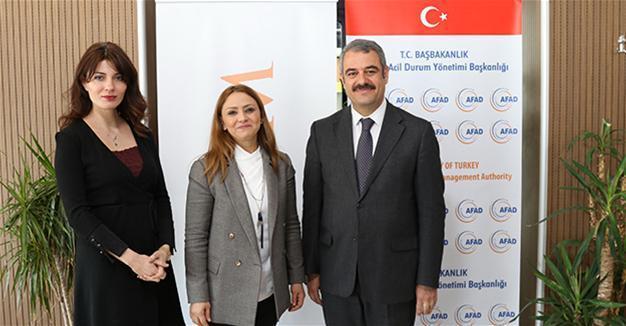Turkey’s disaster agency and KADEM to work for integration Syrian women and children
Sevil Erkuş - ANKARA
 Turkey’s disaster agency AFAD and the Women and Democracy Association (KADEM) have accelerated a project for the social and economic integration of women and children refugees in Turkey.
Turkey’s disaster agency AFAD and the Women and Democracy Association (KADEM) have accelerated a project for the social and economic integration of women and children refugees in Turkey. “We realized that the situation of women and children is the most important issue among the problems that Syrian refugees face in Turkey. If we don’t respond to the problems of Syrian children and do not introduce them into society, there is a risk that they could fall into the hands of criminal syndicates,” KADEM head Sare Aydın Yılmaz said on Feb. 23.
Speaking to the Hürriyet Daily News, Yılmaz also complained that “certain civil society organizations” are allowed to enter refugee camps with U.N. permission and often use their findings “in a negative way against the credibility of Turkey.”
KADEM and AFAD plan to introduce an inventory study inside and outside refugee camps in order to better identify the needs of refugees. Yılmaz said the association’s initial work showed that 90 percent of Syrian women in Turkey were professionally “qualified and educated,” including psychologists, doctors and sociologists.
Turkey currently hosts 3.5 million refugees and nearly 2.8 million of them are Syrians. Almost 80 percent of this number are women and children, Yılmaz said.
Some 150,000 Syrian children up to the age of six have been born in Turkey, and many do not even know Turkish, Yılmaz said, emphasizing the importance of language courses.
Turkey conducted an “open-door” policy for Syrians and provided their basic needs in earlier years but neglected to pay close attention to their qualifications.
“We don’t really know who many are. Now the government has to put an integration policy into effect,” Yılmaz added.
“We aim not only to respond to their needs, but also to give them hope for the future,” said Sümeyye Erdoğan, the vice chair of KADEM and daughter of President Recep Tayyip Erdoğan, adding that they will focus primarily on language training.
The project will launch Turkish language courses for refugees and Arabic courses for Turkish citizens in order to encourage social integration.
With the Economic and Social Cohesion Profile Screening Study, profile studies will be made through face to face interviews with 5,000 Syrians living in Istanbul and Ankara.
A center will be established in Istanbul to provide support to the economic, social and psychological issues for Syrian refugee women, aiming to ease the integration of both them and their families.
As part of this project, Arabic leaflets will be printed to reach refugees living in the related areas, especially the Fatih district of Istanbul. Psychological support and group therapy will be carried out with two psychologists, aiming to assist refugee women’s mental issues. Vocational training programs will also be realized for the women, considering the social and cultural conditions in which they find themselves. Within this context, initially handicraft courses will be opened and the products produced will be turned into economic values.
















